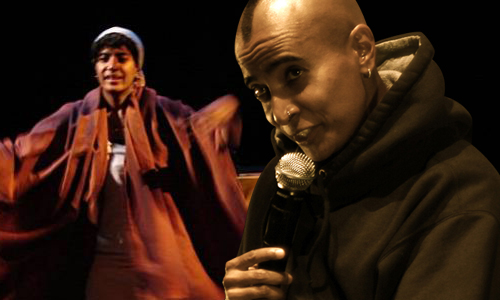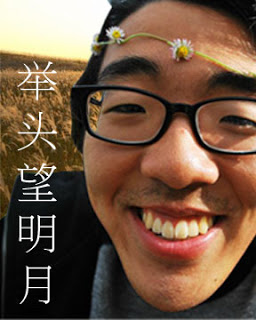D'Lo
- Artist D'Lo
- D'Lo's Works
- Contributor Ben Kim

D'Lo is a self-identified queer artist, ethnically Sri Lankan Tamil but native to the city of Los Angeles. Though he is most well-known as a political performance artist who expresses himself through word, theater, and comedy, he is also musically trained, holding music degrees from UCLA and NYU, and a prolific community activist, frequently holding workshops and serving for many queer/immigrant/arts-centered organizations. D'Lo has performed in several US cities, as well as Canada, UK, Germany, Sri Lanka, and India.
D'Lo's blends artistic expression (through theater, dance, music, and poetry) with empowering socio-political messages to deliver his own enriched narrative. Rather than solely utilizing the kind of stony angst that is so common among contemporary political art, D’Lo’s works also draw from his laughter and youthfulness to present his personal experiences. His humor is in some shows heartbreakingly gentle and in others uproariously crass; D’Lo, if anything, displays a firm mastery of versatility in his performance. In many of his shows, he often performs solo, portraying a wide swath of diverse characters ranging from the dramatic to the comedic, young to old, male to female (and everything in between).
D’Lo’s particular experiences as an transgender youth growing up between a traditional Sri Lankan immigrant family and a world of urbane hip-hop are foundational to his works. He is unapologetic in his honest confrontation of the contradictory ways that race, gender, queerness, class, and national origin have shaped his understanding of the world. As he puts it, “Gay Hindu Hip Hop- These 3 things make me but don’t allow for one another.” He is adept at presenting the sobering realities of existing queer and ethnic in America, but not at the cost of sacrificing love and humor.
“You can’t call yourself a revolutionary if you have a problem being nice.”
Sources: www.dlocokid.com
Ramble'Ations
Ramble-Ations is one of D’Lo’s first stage productions, a solo piece written, performed, and composed by D’Lo himself. Through a conglomerate of several intersecting narratives told through the perspectives of the multi-gendered characters that D’Lo plays, he tells the stories of his experiences as a queer American born into a Tamil Sri Lankan Hindu family. He has constructed a great deal of characters, some based off of real people, like Amma (D'Lo's mother), and some imaginary, intended to be representative of the cultural influences in D'Lo's life.
The production is made up of many small scenes or skits - in this way, D'Lo works to express to the audience the myriad ethnic, cultural, geographical, and religious influences of which he is composed. D'Lo says "Queer Hindu Hip-Hop, these three things make me but don't allow for one another. This is my attempt at fusing these elements of my being (and my imaginary friends) onto the stage". In this way D'Lo is really using Ramble-Ations to ask the same question to all immigrant Americans: how does one reconcile living in a country where one's identity is in a constant state of flux, at once everywhere but always nowhere.
D'Lo's performance is stellar not only for the issues that it raises and the insight into Queer immigrant America that it gives, but also for its adept manipulation of humor to deliver its message. He is an expert at not taking himself too seriously while still giving himself credit for the particular struggles he has overcome. Presented parallel to the character roles in Ramble’Ations is D’Lo’s everyday self, candidly speaking about his personal struggles with family and adulthood.
Amma
One of the scenes from Ramble’Ations is called ‘Amma’, a short monologue in which D’Lo embodies a depiction of his own mother, and details a couple pivotal experiences and events in his childhood.
From the perspective of Amma, D’Lo first narrates his mother’s reaction to his coming out. She (Amma) says, “At first, I blamed myself.” Although this was said quite tongue-in-cheek and framed within some humorous quips about D’Lo’s early signs of gender non-conformity, out of context it is soberingly honest. I felt like D’Lo, in this one utterance, captured a candid representation of the emotions and apprehensions of immigrant parents of queer youth. Furthermore, Amma’s confusion over her assumption that all gays are white, citing D’Lo’s dissimilarity to figures like Ellen Degeneres, Rosie ‘O Donnell, etc, is a clever allusion to the media and cultural representations of gay people outside the US.
Then later in the scene, D’Lo approaches the subject of her late older sister’s death - articulating her parent’s pain and disappointment by saying through Amma, “why did you take my oldest daughter and leave me with a gay?!” The audience was laughing uproariously, and I was too, but I had to stop myself and realize for a second that D’Lo was so adeptly tempering and repackaging what was probably an immensely confusing and complex emotion - not only the emotional shock of losing a sibling, but also the shame of being the unwanted ‘black sheep’ of the family. It was incredible how D’Lo, through the character of her mother, was able to so easily enunciate her own emotion so succinctly.
I echo the sentiments of one of my classmates who also viewed this video, “the most sacred part is remember that it is not Amma, but D'Lo's performance. Its almost as if my brain crashed when i remembered who i was watching.”
Boys that Pray: A staged reading
D’Lo’s website describes his work ‘Boys that Pray’ as a play about “masculine women/folks of color who identify with or whose loved experience reflects that of the transgendered community in their gender presentation. The play tackles issues of masculine voices within the feminist/womanist movement and the lives of those who live under the margin of where the LGBTQ/Queer community conducts all their policy change and equal rights agendas. This is a soul-filled piece on surviving, being examples of surviving and maintaining sanity in an exclusive world where boys that pray are prey to intolerance and close-mindedness. This piece is dedicated to the unspoken emotion attached to the forgotten bodies in this battle to live wholly and holy in society.”
Like much of D’Lo’s other works, ‘Boys that Pray’ concerns the particular experiences of transgender individuals, in this case, with respect to the mainstream LGBT political agenda. He is able to weave voices of personal love and struggle with the frustration of being an oft-excluded T in LGBT to create a uniquely colored presentation of female masculinity. Feminism will frequently illuminate the trials of being feminine in a male-centric world, but D’Lo proclaims that we must lend our ears to masculine voices of the elided and excluded as well.
One of the lines from the reading is, “not gay, GUY.” I think this exemplifies a common struggle of transgender individuals, having to manually divorce the concepts of being gay and being transgender in a society that always conflates the two.
Sources:
all clips from D'Lo's youtube channel - www.youtube.com/user/dlocokid
informative content from: www.dlocokid.com

My name is Ben Kim and I am a second year undergraduate student at UCLA. I originally hail from Anaheim, California, a mere 40 miles away from West LA where UCLA is located. My major is (pure) Mathematics, but I am also interested in queer history/theory and as such am also working towards an LGBT Studies minor.
Aside from math and queer studies, some of my other academic interests include Chinese language/culture, linguistics, and philosophy. Outside of the classroom I enjoy exploring LA's food and music scene, practicing yoga, and performing with UCLA Poongmul (traditional Korean drumming).
I am taking this course, Queer Arts in LA, because I identify strongly with the city of Los Angeles and am interested in learning more about both its art and queer world, two elements of LA culture that I have thus far not really been exposed to. Some other Queer Studies classes that I have taken include: Intro to LGBT Studies, Queer and Feminist Legal Theory, and Psychology of Multiple Social Identities.


